Lamps for the bathroom on the ceiling: types, placement principles, installation nuances
No matter how original the interior is, everything can be ruined by the wrong light. It is not surprising that the issue of lighting occupies quite an important place when arranging premises for various purposes.Moreover, this is no less important for the bathroom than for other functional rooms.
We will tell you how to choose the right bathroom ceiling lamps from among the products offered for sale. We will advise you on what needs to be done for rational placement and error-free installation. Taking into account our recommendations, you can easily create a cozy and pleasant atmosphere in a hygienic room.
The content of the article:
- What to consider when choosing devices?
- Types of bathroom fixtures
- Features of built-in and overhead models
- Rotary and non-rotating devices
- Types of lamps for lighting fixtures
- Lamps in the bathroom interior
- Location of light sources
- The nuances of installing lamps in the bathroom
- Conclusions and useful video on the topic
What to consider when choosing devices?
In the process of creating a design project, it is necessary to select the optimal model of the lamp, taking into account the characteristics of the room, the design and texture of the finishing materials.
For example, built-in models are not suitable for arranging a bathroom with a ceiling made of a monolithic concrete slab. In this case, it is better to use overhead fixtures or ceiling fixtures in the form of chandeliers.
In an effort to create a stylish interior and a comfortable environment, special attention must be paid to the choice of lighting equipment. In this case, it is necessary to take into account the design, characteristics, dimensions, lamp power, methods of mounting the electrical appliance and the need for additional structural elements.
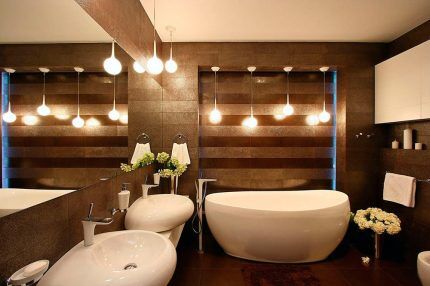
If the bathroom is large, then a beautiful chandelier will look organic.But spot models, correctly and evenly distributed throughout the ceiling space, will allow you to create a stylish interior that takes into account current trends.
When choosing lamps, the following factors must be taken into account:
- room area and distance between lamps;
- zoning of the room, the need to highlight separate areas;
- instrument level;
- interior style direction;
- color scheme of walls, floors, furniture and plumbing;
- the presence of mirrors, tension structures, ceramic tiles and other surfaces that reflect light.
Before you begin installation work, you need to think through the layout of the light sources and the nuances of cable routing. Some models offered by manufacturers in the assortment require the creation of special conditions.
The quality of products directly affects their service life. Expensive branded models of built-in or surface-mounted lamps compare favorably with cheaper ones. They are of higher quality, wear-resistant, and therefore retain their aesthetic appearance for a long time.
In an effort to create a stylish and original interior in the bathroom, we must not forget about safety. Electrical devices intended for installation in rooms with high humidity must have a maximum degree of protection, which corresponds to the IP65 marking.
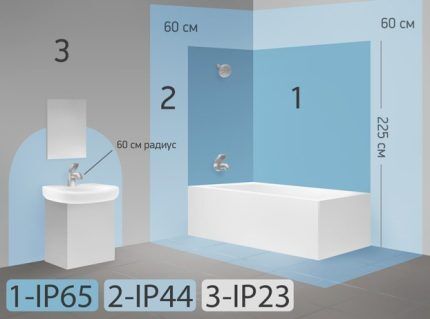
When arranging rooms with high humidity levels, certain rules must be followed.
The following recommendations will help you organize safe room lighting:
- You can only use moisture-resistant electrical appliances with a degree of protection of IP24;
- in areas of high humidity, install low-voltage devices up to 12 V;
- use lighting devices of protection class 2 near the bathtub or shower stall;
- it is desirable that all metal parts are made of stainless steel or have anti-corrosion properties;
- Light bulbs and other heated parts of electrical appliances must be equipped with protective covers or shades.
You should also remember about the features and properties of light rays. So, next to the washbasin it is better to use lamps with a softer yellow light. Otherwise, the mirror will reflect rather pale skin, which will prevent you from applying makeup correctly.
With selection rules color temperature and the article we recommend will familiarize you with the nomenclature designations of lighting devices, allowing you to select an LED light bulb in accordance with this important characteristic.
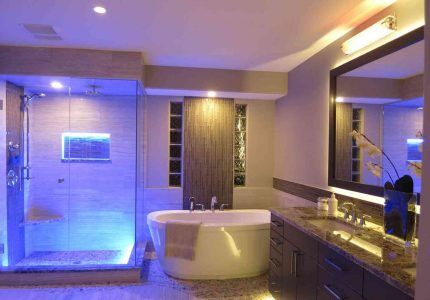
For a bathroom with dimensions of 5x2 m, 2 lamps of 60 W are sufficient. You can use 2 lamps spaced on the sides, but in this case the mirror will require additional lighting. Will introduce you to guidelines for selecting lighting fixtures for the bathroom informative article, the content of which is entirely devoted to this issue.
Types of bathroom fixtures
When arranging any room, it is important to correctly select and install lighting fixtures, which for a combined bathroom or separate bathroom are divided into subgroups according to several criteria.
Location and level of moisture resistance
Light sources can be installed at various points in the room. Depending on this, they can be wall-mounted, ceiling-mounted, floor-mounted, built-in into a shower stall or into a mirror.
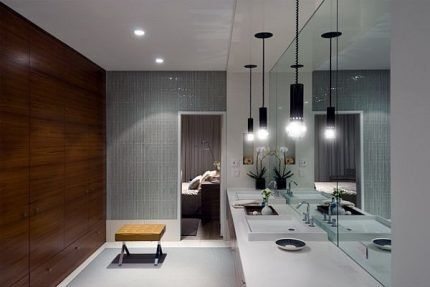
There are ordinary and moisture-resistant lamps installed in the ceiling in the bathroom. The second option is intended for installation in rooms characterized by high humidity.
They are made of moisture-resistant materials, and their design does not allow splashes of water to get inside the device. On the body of the device indicate degree of protection, which allows you to accurately select a product for safe operation in difficult operating conditions.

Separation by placement method
Lamps can be open or recessed. These subgroups differ in the method of their placement - on the ceiling or on the wall of the room. Depending on this factor, they can be point-mounted and suspended or wall-mounted.
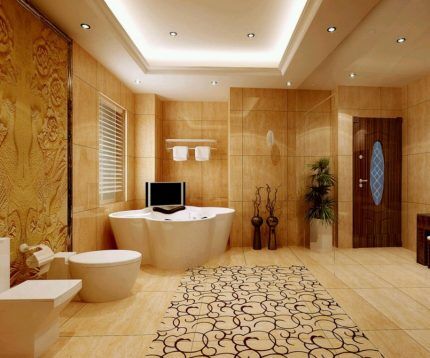
Due to the fact that there is a high level of humidity in the bathroom, it is better to use lamps equipped with shades. If you use regular lamps, the contacts will quickly oxidize. This will make the device unsuitable for further use.
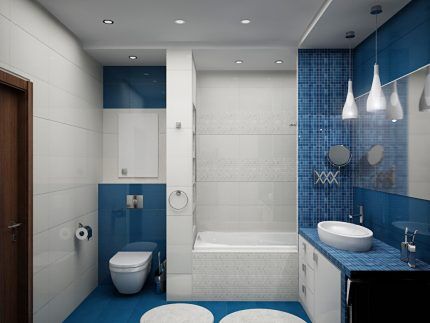
Features of built-in and overhead models
There is a wide range of lamps of different designs on the market.They can be attached to the base of the ceiling or above its level, regardless of the type - plasterboard, tension, slatted.
Depending on the mounting method, devices are divided into three types:
- invoices;
- mortise or built-in;
- semi-mortise.
Mortise ones differ in depth parameters. Therefore, when choosing, you should take into account the distance to which the ceiling in the room is lowered. The size of the space behind the ceiling structure is at least 40 mm. For individual lighting systems, it is necessary to lower the pendant systems by 85-100 mm, which is unacceptable for a bathroom with a low ceiling.
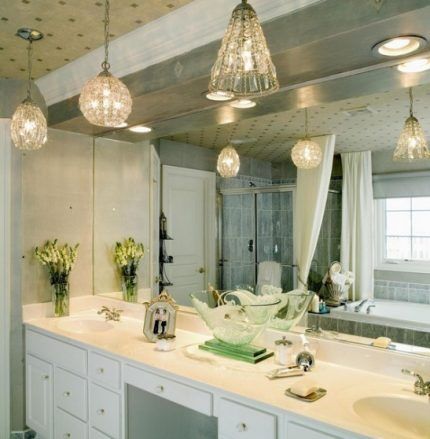
Built-in equipment has light directed downwards, so it does not cover the entire surface of the ceiling. And spot lighting illuminates the space locally, allowing you to create dim lighting in the bathroom.
This is the best option for rooms where they will look perfect lamps and suspended ceilings. They allow the apartment owner to create an original interior design by investing a minimum of money.
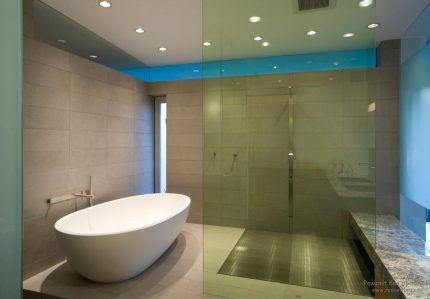
Overhead light sources have their own nuances when installed in a room with a suspended ceiling. It will be necessary to use hangers so that the fabric covering or film does not sag during operation.
Such models will look impressive and stylish in a modern interior. They leave bright highlights on glossy, textured, mirror and shiny materials.
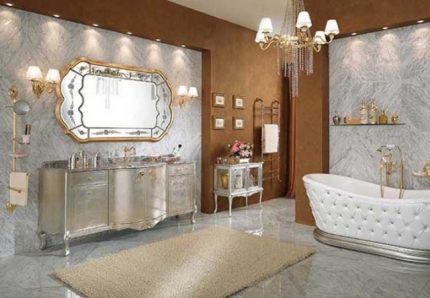
The technical part of the semi-mortise device is installed in the inner part of the ceiling, and the lampshade is located outside.
For their installation, space is required behind the ceiling structure. In this case, the light is directed perpendicular to the plane and scattered throughout the room, which allows the use of more powerful light bulbs.
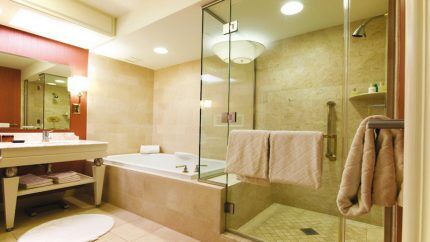
Rotary and non-rotating devices
Directional light allows you to find the right solutions in lighting different areas. For this reason, rotary models are often used as targeted sources. They are distinguished by a relatively simple design - the body of the device is fixed in the inter-ceiling surface, and its outer part rotates.
The device can rotate in different directions and direct a beam of light to a specific area. It is used to highlight the bathtub, shower stall, sink and vanity.
This type of lamp is perfect for emphasizing individual bright elements of the interior - it will effectively display a unique vase, an attractive panel or an original floral arrangement.
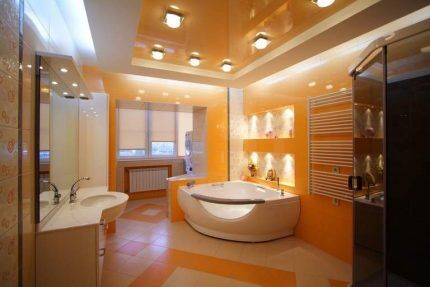
Fixed devices are distinguished by their stationary mounting and targeted lighting. When they are turned on, the light rays are directed in one direction, usually downwards.
In order to rationally distribute the light emanating from fixed models, they are installed in groups. The devices are placed in a line, in a circle or in some other way.Their number depends on the area of the room.
Spot models in which they are installed specific light bulbs, are compact. According to their design, they are divided into protruding from the ceiling surface and hidden in the ceiling suspension system.
Electrical appliances recessed into the bathroom ceiling are suitable for any interior design, but they provide less light. The light flow is directed clearly downwards and only a small area located under the device is illuminated.
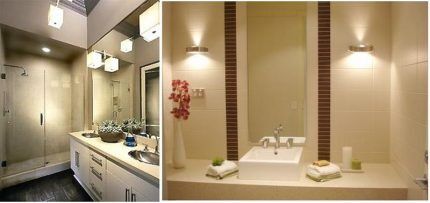
Types of lamps for lighting fixtures
Often for organization lighting in the bathroom choose a simple and convenient incandescent lamp. It attracts with its low cost, but is inferior halogen devices And LED models.
Its main disadvantages:
- short warranty period ranging from 1,000 to 1,500 hours;
- if the length of the plinth or size does not suit the design of the ceiling, the suspended structure must be lowered;
- It has no protection against power surges, so it quickly burns out.
If you regularly turn on the lights in the bathroom, instead of traditional lamps, it is better to give preference to a 5 times more economical option - energy-saving.
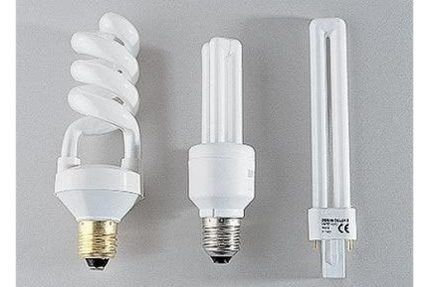
Halogen lamps can be installed in ceilings that are low. In any case, the light flux will be uniform. They provide more light than classic ones, save energy and can be used 3 times longer.
These light bulbs also tend to burn out. To replace a damaged one with a working one, you need to remove the retaining ring located on the spring, remove the cone and install a new one.
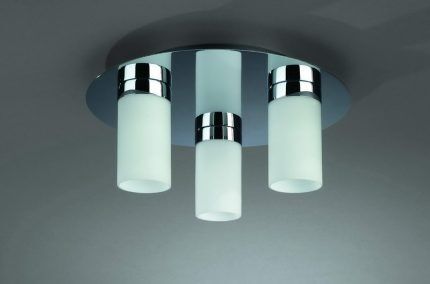
It is not recommended to install lamps with capsule halogen light sources without protective glass.
LED lamps are distinguished by their aesthetic design and strict contour geometry. They are made in gold or silver shades, similar to the color spectrum of plumbing fixtures.
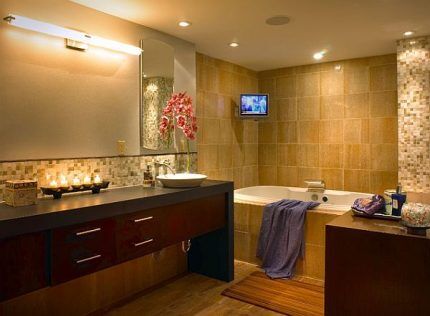
The main advantage of LED devices is the low level of electricity consumption. It is ten times smaller than the good old incandescent lamps.
In addition, a number of other advantages should be noted:
- the number of turns on and off does not reduce the service life of the product;
- maximum light output 120 lumens/watt;
- a wide spectrum is possible without the use of light filters;
- LED incandescence up to a maximum of 60 °C;
- safety in case of damage due to the absence of chemical compounds and glass fragments;
- long service life (up to 50,000 hours).
This type of lamp is characterized by the absence of a natural type of luminous flux. To slightly soften the monochrome of the harsh rays, you will have to use additional phosphors. To prevent the light from pulsating, you will need a balancing capacitor.
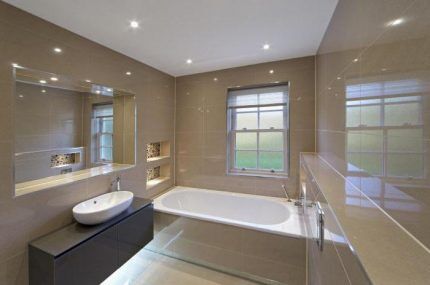
Lamps in the bathroom interior
Shocking modern styles require original lighting. For example, for an interior decorated in the Art Deco style, bright lamps framed with expensive wood, genuine leather and stunning semi-precious stones are ideal.
For a bathroom in a laconic high-tech style, symmetrical and clear lighting in the washbasin area and even rows of silver spotlights are suitable. And classic presupposes naturalness, elegance and luxury - they install aesthetic sconces with shades on the walls and overhead glass or crystal products on the ceiling.
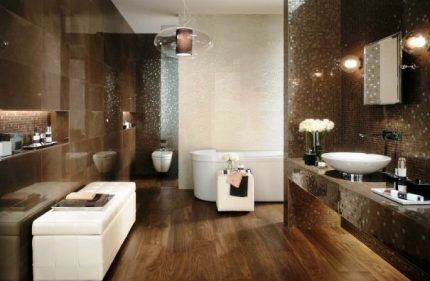
In a bathroom with a small area, the interior often gravitates towards minimalism, where you can diversify the lighting. For example, setting original lighting in the form of an LED strip that will illuminate certain areas. You can use lamps of different shades, combine electrical lighting devices - sconces, chandeliers, built-in spot models.
Location of light sources
When choosing the placement of lamps, it is necessary to make maximum use of the luminous flux emitted by them. In a room with a small area, it is advisable to install built-in light sources, placing them around the perimeter of the room.
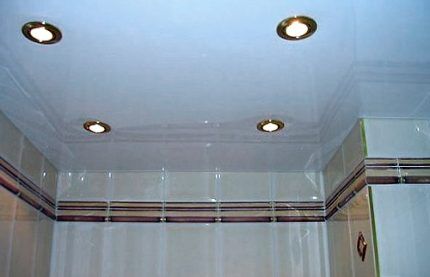
If you want to highlight individual zones, then you should consider placing decorative lighting in the designated places. As a rule, built-in spotlight products are intended for general lighting. For local lighting, decorative lighting from linear LED lamps or flexible LED strip is used.
As for the required number of lamps, here you will need rules for arranging residential premises. According to sanitary standards, the illumination of the bathroom should be no less than 50lux.
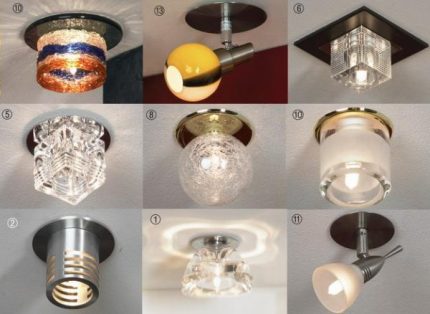
You can calculate how many lamps are needed to illuminate a small bathroom with parameters of 2x3 m. For this you will need:
- 2-3 incandescent lamps with a total power of 150-180 W;
- about 4 LEDs with an indicator of 18-24 W;
- or a dozen energy-saving ones at 30-40 W.
Knowing the power, you can determine the total number of lamps and choose a way to place them on the ceiling.
The nuances of installing lamps in the bathroom
It is important to take care of safety when arranging lighting in the bathroom. To do this, you need to check that the wiring in this room is grounded.
Another important point is to buy only lamp models with a sufficient level of protection. Do not forget that splashes from swimming can easily end up inside electrical appliances, which can lead to serious problems.
The complexity of installing lighting fixtures for suspended ceilings depends on the type of ceiling structure. If the bathroom has a ceiling made of PVC panels or plasterboard, then installing a light source will not be difficult.The lampshade must be inserted into the hole for the lamp, and then pressed with a spring.
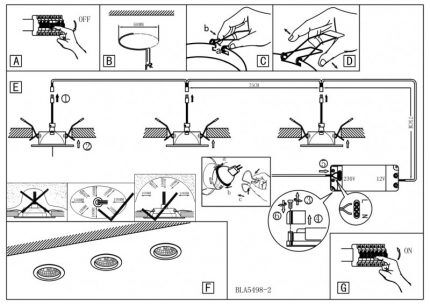
If the bathroom has suspended ceilings, then lighting fixtures designed for suspended structures will be required. They are attached to guides or ceiling tiles.
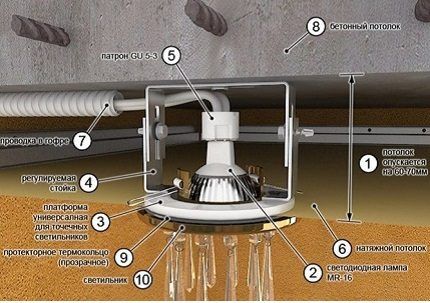
Conclusions and useful video on the topic
Choosing lighting fixtures for the bathroom in the video:
The subtleties of self-installation of a spotlight are covered in the video:
There is a wide range of lamps on the market. They differ in design, function, appearance, placement method and installation.
To achieve the desired result in the bathroom, focusing on the most spectacular details, you will need to determine the number and power of lamps. When choosing them, it is important to comply with safety standards, choosing electrical equipment with a moisture protection level greater than IP44.
Please write comments, ask questions, and post thematic photos in the block below. Tell us about how you chose lamps to decorate your own bathroom or combined bathroom. Share the arguments that influenced your choice and information that will be useful to site visitors.


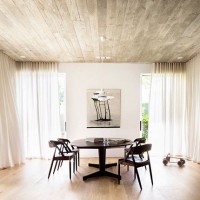
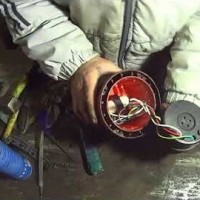
I have a bathroom measuring 6*3 m. I decided that two pendant lamps with shades would be enough. The ceilings are quite high, so built-in lamps would not be suitable, since they illuminate locally and there simply would not be enough light for the room.This is important for me, because I apply makeup in the bathroom. If I had this smaller room, I would have opted for recessed lights.
I bought exclusively closed lamps for the bathroom; I often let in a lot of steam, and I don’t want anything to short out. I have a fairly large bathroom, fifteen meters, I hung sconces with hermetically sealed shades near the mirror, and an LED ceiling lamp on the ceiling. In my opinion, this is the most suitable lighting option in the bathroom.
In our bathroom we have one lamp on the ceiling with two 15W energy-saving lamps, so I don’t have enough light; more powerful lamps somehow burn out quickly. The bathroom is quite cramped, about 3.5 square meters, but nevertheless it is necessary to change the situation with the light. Now I’m thinking about a new design with spotlights. I want to place them on the ceiling and near the mirror, and maybe also on the floor.